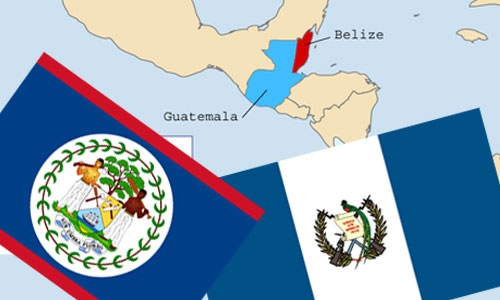BELIZE:
Statement by the Hon. Dean Barrow, Prime Minister of Belize
on Recent Increase in Tensions between Belize and Guatemala
Press Conference
Biltmore Plaza Hotel
April 25, 2015
We have just concluded a meeting of the National Security Council of Belize, and this is a follow-on from the meeting held on Friday when I was in New York, and in which I participated by phone. I am wholly satisfied, based on the NSC’s review of all the facts and its discussion of the pathway forward, that the immediate crisis provoked by Guatemalan President Jimmy Morales’s extraordinary address to his nation after the exchange of fire between Guatemalan civilians-who fired first-and the BDF leading to the death of a Guatemalan minor, is over. I am convinced that diplomacy, Belize’s invocation of the Confidence Building Agreement, and its call for peace and the de-escalation of the threat and tension created by the Guatemalan response and the measures that had been announced by President Morales, has worked. Our position has been noted and supported by the international community, and ultimately accepted by Guatemala. There has therefore been success in defusing the situation to a point where the return to normalcy has begun, and the two countries can start again to work on the reiteration and expansion of the protocols governing the complex relations between us.
I had already reported to the nation by phone on Friday from New York on my meetings and discussions that day with the Deputy Secretary-General of the United Nations; the Secretary-General of the OAS; the Secretary General of CARICOM; and, most importantly, President Jimmy Morales of Guatemala.
I repeat now that President Morales committed to me his agreement to our mutual de-escalation of the tensions that had arisen over the Cebada incident. It is true that he maintained at all times his strong and vigorous protest over what he described as the unprovoked BDF attack on innocent Guatemalan civilians and the ‘murder’ of the Guatemalan minor; and it is true that he repeatedly insisted on the need for justice for Guatemala and its citizens. But it is also true that I placed on record, and repeated throughout, the fact that the BDF patrol had come under fire first, and had responded in self-defense, firing in the direction from which they had been shot at. I made the further point that the civilian members of FCD, who had accompanied the patrol, confirmed the BDF’s version of events. I regretted the unfortunate loss of life of the Guatemalan minor but recollected that the BDF had several times before come under fire in that very area from armed and dangerous Guatemalans engaged in illegal activities and pillaging of Belizean forests, environment and resources. Our military had every right to defend itself and our patrimony.
I also pointed out that the OAS had already commenced an impartial investigation into the incident, and suggested that Belize would be willing, as we had done in a similar incident some time ago, to seek additional expert forensic help from the Americans to aid the OAS inquiry. Belize and the BDF had nothing to hide in circumstances where our actions were necessary and justifiable.
President Morales said that the killing of Guatemalans by the BDF could not continue, and that Guatemala must protect its citizens and would, among other things, seek redress for the death of the minor from the Inter American Human Rights Commission. But he agreed with me that while the OAS inquiry and Guatemala’s petition to the Human Rights Commission were proceeding, it was absolutely necessary to dial down the tension between our two countries. He therefore committed again to de-escalation, and accepted that I would make public to Belize and to the international officials to whom I would speak, his commitment.
Yesterday afternoon I consulted once more by phone with OAS Secretary-General Almagro, who briefed me on a meeting he had just held with President Morales. The SG reported that President Morales had also confirmed to him Guatemala’s commitment to de-escalate and proceed in peace with Belize as we try to work through our difficulties.
Then last night the Guatemalan Foreign Minister spoke to our Foreign Minister and repeated the position of his President regarding the commitment to peace and de-escalation.
It is on the basis of all this, Ladies and Gentlemen, that I say that any immediate danger has passed and our nation can, for the moment, rest easy.
Of course, our diplomatic outreach must continue full force. Baroness Scotland, the new Secretary-General of the Commonwealth, visits Belize later this week. I will fully brief her and ask for a meeting of the Commonwealth’s Standing Ministerial Committee on Belize. Foreign Minister Elrington attends the UK/Caribbean meeting on Friday in the Bahamas, and will brief a CARICOM caucus convened for the morning of that meeting. I see the Mexican Ambassador this afternoon and our American and British friends are fully in the picture. I will also on Wednesday have a visit from, and update, Canada’s High Commissioner to Belize.
President Morales and I agreed that as we go forward an operational modality must be found to eliminate the possibility of conflict between our two countries in the Adjacency Zone, and especially on the Sarstoon. The work will proceed in that regard at both the military and political levels.
Before I take your questions let me conclude by thanking Belizeans for the solidarity and resolve that was evident as the crisis was unfolding. The statements made by the Leader of the Opposition, and various organizations and social partners, were also extremely helpful. Finally, I thank the Security Forces of this country for their steadfastness in daily carrying out their job of protecting our country in the face of overwhelming odds.





